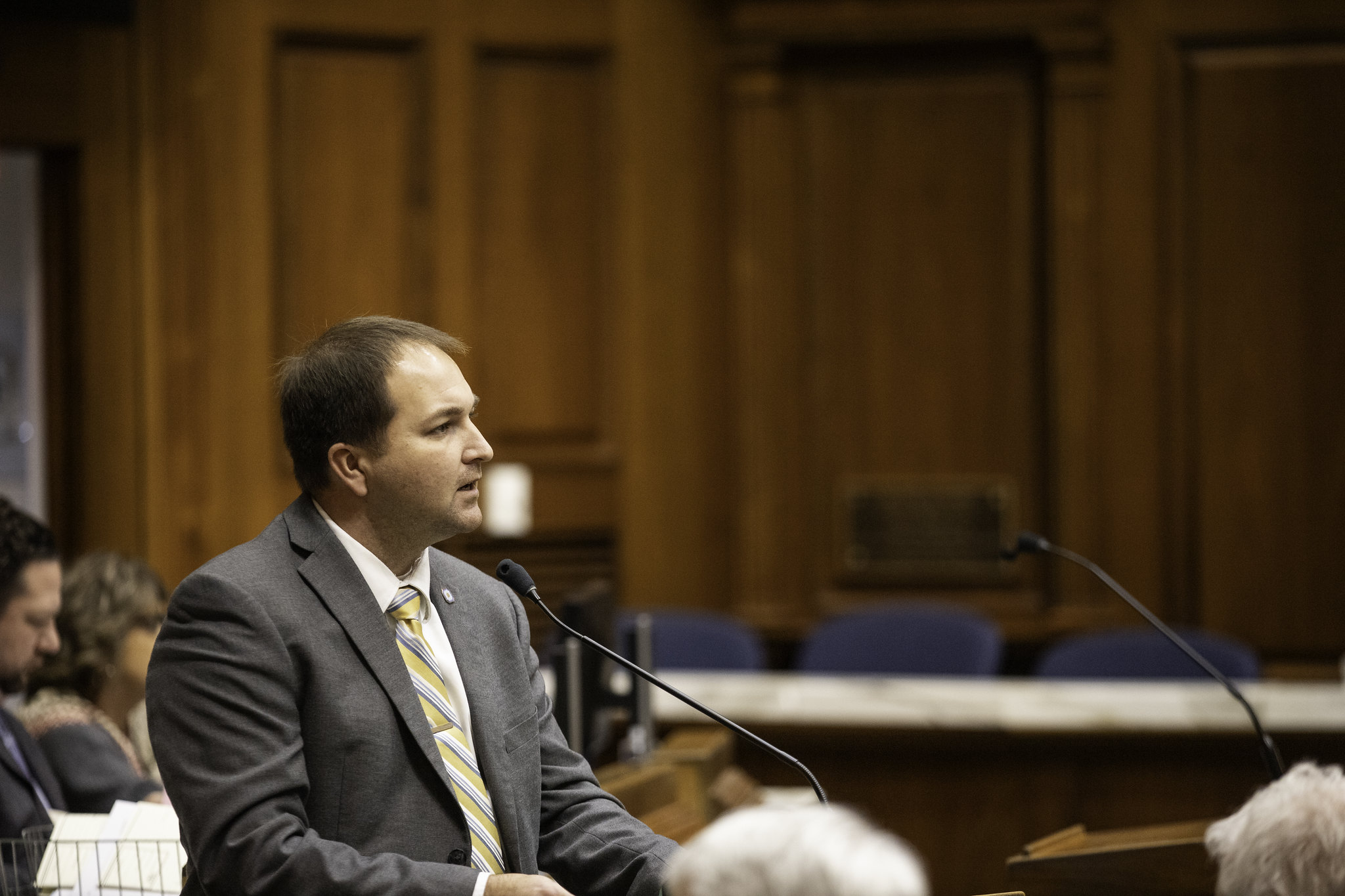Dozens of bills are headed to the governor’s desk for final sign-off, but even more have stalled — or appear to be dead altogether.
Despite earlier momentum, legislation dealing with rape kit backlogs, immigration enforcement, social media restrictions for minors, and more ultimately missed key deadlines and failed to advance in the final weeks of the session.
Those issues won’t be officially settled, however, until lawmakers close out the session for good. Bill language could still reappear elsewhere — via closed-door conference committees — during the coming days.
Republican leadership said they plan to finish this year’s business by Thursday, April 24, but the session isn’t legally required to end until end-of-day on the following Tuesday, April 29.
‘Dead for good’
Although a bill prohibiting some Hoosier minors from using social media without their parents’ permission got bipartisan support in the Senate, the House took no action.

Senate Bill 11 would have required anyone under the age of 16 to secure permission from their guardians before accessing apps like Facebook, Instagram or TikTok. Another provision allowed Indiana’s attorney general to issue a civil investigative demand to determine if a social media site violated the law, with civil penalties up to $250,000.
Following a 42-7 vote in the Senate in January, the bill was assigned to the House Judiciary Committee. Rep. Chris Jeter, R-Fishers, never gave the proposal a hearing.
The bill’s author, Sen. Ryan Bohacek, R-Michiana Shores, attempted to amend the language into a foreign trade bill during the second half of the session, but he told the Indiana Capital Chronicle it was deemed non-germane, so he never called it for a vote.
“It’s dead for good,” Bohacek said, but he’s open to bringing the bill back in 2026.
One of several controversial anti-immigration bills this session also died in the second-half of session despite passing the full House in February.
House Bill 1531 would have mandated local compliance with federal immigration detainer requests and leveraged local government funding to ensure cooperation with federal authorities like U.S. Immigration and Customs Enforcement (ICE).
It also would have targeted employers who hire a person who is not legally allowed in the U.S.
The bill died after the Senate Judiciary Committee, helmed by Fort Wayne Republican Sen. Liz Brown, declined to hold a hearing.
“I’ve had a lot of conversation with Sen. Brown in the second half of the session … she’s not comfortable moving it this year due to a few different things in the bill,” said bill author Rep. J.D. Prescott, R-Union City, who could file a similar bill in a future session. “I’m still looking at other options, but more than likely, it’s not moving this year.”
Still, a separate immigration-focused proposal, House Bill 1393, is headed to Gov. Mike Braun’s desk.

The bill requires jails and detention facilities to tell county sheriffs when they have probable cause to believe that someone they’re booking on unrelated misdemeanor or felony charges isn’t legally in the country. Sheriffs would have to report that information to ICE.
Senators additionally killed a contested elections bill that aimed to put school referendums and public questions only on general election ballots.
Rep. Tim Wesco, R-Osceola, who authored House Bill 1681, previously emphasized that more voters participate in general elections than primaries. Democrats opposed, arguing that the change would strip local control and put more financial stress on schools.
Ultimately, though, the referenda language was signed into law in Senate Enrolled Act 1.
Also dead is House Bill 1413, which sought to eliminate the state’s backlog of rape kits and help counties with legal costs. Rep. Becky Cash, who authored the proposal, pointed to the current six- to eight-month wait for rape kit processing in Indiana, which crime technicians and law enforcement have attributed to a lack of equipment and staff.
The bill earned unanimous support from the House, and the chamber’s budget-drafting committee created a $2.5 million line item for the proposed Rape Kit Backlog Fund. Momentum continued in the Senate corrections committee, but the multi-million dollar appropriation is likely in jeopardy following this week’s grim revenue forecast. State budget writers said cuts are on the way.
Left out of the budget, too, was a $500 tax credit per newborn child for eligible taxpayers — or $250 for a married person filing a separate return.
Originally offered in Senate Bill 497, the credit would have been available for families earning up to 720% of the federal poverty level. The proposal passed 47-0 from the Senate but never made it into the state’s spending plan.
Other bills on the chopping block
Hundreds of other bills additionally failed to cross the finish line. Among those are:
House Bill 1174, pay day loans: The House narrowly advanced Rep. Jake Teshka’s bill to create new, longer-term loans of up to $5,000 — with steep monthly service fees stacked atop interest and other charges. The measure would have also allowed lenders overseeing larger borrowing, like car loans, to charge interest rates as high as 36%, up from the current cap of 25%. The Senate’s insurance committee left the bill untouched.
Need to get in touch?
Have a news tip?
House Bill 1285, special education classroom cameras: A repeat attempt by Rep. Beck Cash, R-Zionsville, to mandate round-the-clock electronic recording equipment in special education classrooms, sensory rooms, seclusion spaces and time-out areas was stripped from the underlying bill by the House Education Committee. What’s left in the measure — which has since advanced from the Senate and is awaiting final House approval — are provisions to allow parents an opportunity to collect their student’s property if the child no longer attends the school, and another to permit parents to record meetings concerning their child’s individualized education program. The bill also requires schools to always have present in each building at least one employee who has obtained nonviolent crisis intervention training.
Senate Bill 126, annexation: An attempt to bridge the differences between House and Senate lawmakers in an annexation compromise met its demise last month after the author criticized the process and rebuked committee members. Sen. Jim Buck, R-Kokomo, has repeatedly authored legislation to rein in what he describes as an “abusive” form of annexation that’s “tilted in favor of the municipalities.” But he rejected an attempt to meld two bills into an annexation compromise, seemingly killing the effort altogether.
House Bill 1432, iGaming: A push to legalize online lottery and casino games passed easily out of the House Public Policy Committee earlier this year but didn’t get a hearing in the Ways and Means Committee, which would’ve taken a closer look at the financial aspects of the proposal. Rep. Ethan Manning, R-Logansport, authored the bill and estimated that the digital lottery and casino games, coupled with sports wagering tax hikes, could bring the state of Indiana more than $300 million annually in new revenue. But some were concerned that online options would cannibalize in-person gaming or lottery sales.
House Bills 1618 and 1237, new state emblems: A lively committee presentation by Jasper Elementary School fourth-graders was not enough to convince lawmakers to name the persimmon as Indiana’s state fruit. That bill died in committee without a vote, as did another proposal to make Myotis sodalis, also known as the Indiana bat, the official mammal of the Hoosier State.
Opposition brings likely end to Indiana utility siting bill, but the issue isn’t going away
House Bill 1628, utility siting: Overwhelming opposition from county officials killed the Republican proposal to shift authority over large-scale utility infrastructure projects from local governments to the state. The bill received multiple hours of discussion in the House utilities committee, but it was never put to a vote and failed to advance to the full chamber. Bill author Rep. Ed Soliday, R-Valparaiso, called it a response to ongoing resistance of local governments to greenlight solar, wind and other renewables projects that are increasingly necessary to support the state’s growing energy demands. Locals said decision-making control over the zoning and approval processes for those proposals was theirs, not the state’s.
Senate Bill 171, abortion pills: A move to ban pill-based abortions, and to require women to file an affidavit of rape to meet one of the state’s few exceptions, got no traction. Filed by Sen. Mike Young, R-Indianapolis, the bill would have outlawed the use of abortion pills even in abortions that meet the state’s narrow exemptions. And it would have required a woman who seeks an abortion under the state’s rape or incest exceptions to provide the doctor with an affidavit under penalties of perjury attesting to the rape or incest. The same requirement was defeated in 2022 during an amendment fight.
Senate Bills 201 and 284, closed primaries and early voting: Legislation slashing early in-person voting days and closing primary elections to unaffiliated voters garnered mixed committee testimony in early February before quietly dying in the Senate. Sen. Gary Byrne’s bill would’ve cut Indiana’s early voting timeline from 28 days down to two weeks. Another measure offered by Sen. Mike Gaskill, R-Pendleton, would have added text to voter registration forms asking Hoosiers to choose their political parties and warning that affiliation is required to vote in a primary election. It also would’ve required county election officials to affiliate registered voters with either the Democratic or Republican Party based on their last primary election votes, and would’ve created a way for voters to change their affiliations.
GET THE MORNING HEADLINES.
Last updated 6:32 a.m., Apr. 18, 2025
This post was originally published on this site be sure to check out more of their content







